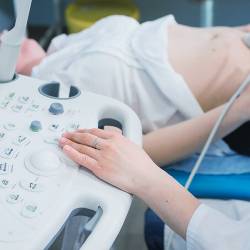Screening examinations

I.trimestr
Screening examination in the I. trimester is performed at week 11 + 3 days to week 13 + 6 days when the size of the foetus from the crown to tailbone (CRL) is 45-84 mm. In this phase of pregnancy we can already determine a diagnosis of congenital defects and evaluate so-called ultrasound markers for a foetal disease. Nuchal translucency (NT) is an important sign. An increased NT may indicate the risk of a congenital defect. In some cases it is important to also evaluate other signs such as nasal bone (NB), tricuspid regurgitation, and ductus venosus. This examination includes a collection of mother's blood used to determine the level of placental hormones and proteins, PAPP-A and free βhCG. Based on these examinations, a combined risk for foetal chromosomal defect is determined, mainly Down's, Edward's and Patau syndrome.

YOU CAN HAVE THE SCREENING RESULT AT OUR DEPARTMENT ON THE SAME DAY.
II.trimestr
An ultrasound examination performed between week 19 and 22 of a woman's pregnancy. It is the most important ultrasound examination to exclude congenital defects of foetal organs. Apart from evaluating the foetus as a whole and each organ, we also determine foetal weight and therefore the correct growth of the foetus. Last but not least, we evaluate the position and appearance of the placenta and the amount of amniotic fluid.
III. trimestr
Examination in week 30-32 of a woman's pregnancy. In this period of time the key examination includes the size and position of the foetus. The organs are again evaluated, including the status and position of the placenta and the amount of amniotic fluid. In some cases we measure blood flow rate in the umbilical cord and other foetal vessels.





